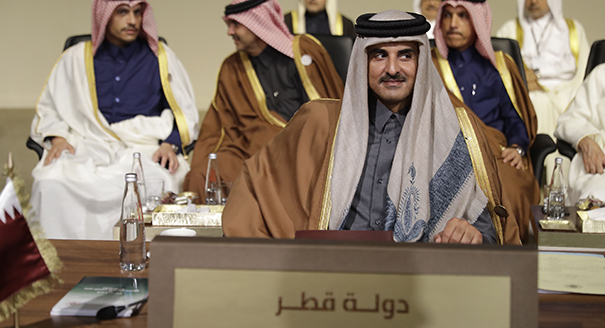Karen Young | Resident scholar at the American Enterprise Institute, focusing on the political economy of the Middle East, the Gulf Cooperation Council, and the Arabian Peninsula
I don’t think Qatar is “coming back” so much as “nudging in,” as it has not traditionally had an interest in or influence over Lebanon in the way that Saudi Arabia has. The recent purchase of Lebanese bonds, which now have junk status, was opportunistic. It was basically a low-cost investment (and probably a rather poor one) to buy goodwill in Lebanon at a time when Saudi Arabia and the United Arab Emirates have not shown signs of support for the country.
Of course, the Qatari purchase then prompted Saudi Arabia and its finance minister Mohammed al-Jad‘an to verbally commit to providing financial support for Lebanon. There is a larger trend of Gulf financial intervention (in the form of direct central bank deposits, investment commitments, oil and gas transfers) in the region and beyond (including the Horn of Africa and Pakistan) that is an effort to buy allegiance, but also to experiment in the export of Gulf development models that are state-centered, profitable for state-related firms, and often personalistic to create ties between leaders. This is upending traditional development finance and its conditionality mechanisms, which have served to hold governments accountable to some structural reform.
Hisham Melhem | Columnist for the Lebanese daily Al-Nahar, non-resident fellow at the Arab Gulf States Institute in Washington, D.C.
Qatar’s decision to invest $500 million in Lebanese government bonds is the latest political attempt at outmaneuvering its archrival Saudi Arabia in a country where Saudi hubris and miscalculations have left a void. Doha is trying to fill this void in the old-fashioned way, through cash. The new Saudi leadership views Lebanon as a black hole in which there is no political return for financial assistance. It is unlikely to match Qatar’s temporary relief.
This Qatari salvo should be seen in the context of its regional offensive to enhance its defenses against the blockade imposed by Saudi Arabia, the United Arab Emirates, and their allies in 2017, and by balancing this alliance off through stronger relations with countries such as Iraq, Jordan, and Sudan. Qatar is also trying to exploit the resentment many Lebanese felt in 2017, when the Saudis summoned Lebanese Prime Minister Saad al-Hariri to Riyadh and forced him to resign after accusing him of failing to check Iranian influence in Lebanon.
Kristian Coates Ulrichsen | Fellow for the Middle East at Rice University’s Baker Institute for Public Policy
The emir of Qatar, Sheikh Tamim bin Hamad Al Thani, was one of a very small number of heads of state to attend the recent Arab Economic and Development Summit in Lebanon, and the only one from the energy-rich Gulf states. Sheikh Tamim’s presence reflected a longstanding Qatari policy of pursuing Arab solutions to Arab problems. This is a continuation of the approach followed by Sheikh Tamim’s father and predecessor, Sheikh Hamad bin Khalifa Al Thani, and his longtime foreign minister, Sheikh Hamad bin Jasem Al Thani, during the 1990s and the first decade of this century. The blockade of Qatar by four regional states, led by Saudi Arabia and the United Arab Emirates, has freed Qatar of the constraints of aligning with narrower Saudi- or Emirati-led interests in the Gulf Cooperation Council. It has also given the Qataris the space to follow a pan-Arab approach to regional developments.
Karim Traboulsi | Editor and writer for the London-based The New Arab newspaper
Feeling increasingly confident after the failure of the Saudi-led blockade against Qatar, Doha is moving to take an assertive posture in the region. It aims to restore some of the influence it lost during the years of the Arab uprisings after 2011. Qatar also appears to be interested in regaining its pre-2011 role as mediator, and its recent moves in Lebanon, as well as in Gaza, Afghanistan, and Sudan, should be seen in this context.
The heavy-handed Saudi approach to Lebanon under Crown Prince Mohammed bin Salman has backfired, leaving a vacuum for Qatar. In addition to scoring a political victory against Riyadh, Qatar may be keen to maintain its soft power credentials in Beirut as a long-term investment in a strategic country widely believed to be the gateway to Syria’s reconstruction. It is well positioned on account of its history of aid to and political mediation in Lebanon, which gives it a more neutral standing among most Lebanese factions.
Maha Yahya | Director of the Carnegie Middle East Center in Beirut
Not really. The emir of Qatar’s 24-hour visit to Beirut during the recent Arab Economic and Development Summit filled a void, marked by the conspicuous absence of most Arab leaders from the gathering, particularly the king of Saudi Arabia. The subsequent $500 million pledge to buy Lebanese bonds buoyed hopes that the visit indicated clear support for Lebanon, whose economic and financial woes are deepening as its domestic political scene is being held hostage to regional power plays and the personal ambitions of some of its leaders. The inability to form a government has undermined faith in the country’s institutions and weakened its economic and financial fundamentals. Had Qatar been looking to support Lebanon, the $500 million would have been deposited at the central bank at favorable or low interest rates. Rather, the bonds purchase will bring Qatar high interest rates, guaranteeing a favorable return on investment in the short term.








